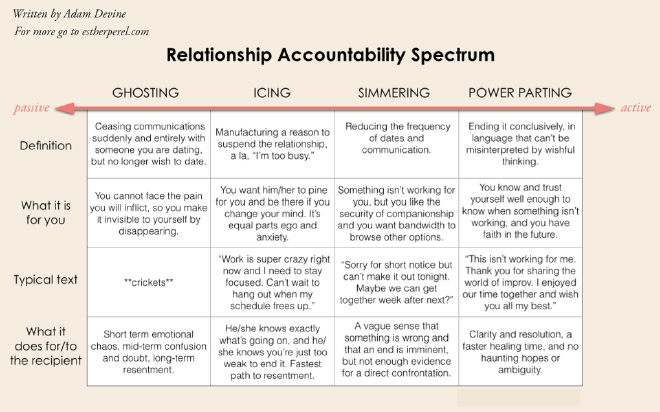I recently stumbled across a post over at Esther Perel’s blog called “ Relationship accountability and the rise of ghosting.” Post author Lindsay addresses consequences of the trend towards ambiguous entanglement and indirect and prolonged breakups and argues for more direct breakups, which they dub “power parting.”
It’s a good article with valid points and includes this chart that helpfully organizes the concepts. This chart’s proper home is here. But I will post it below as well since I just took a moment to type everything within it into alt text for folks with screen readers.
(I didn’t find any for the image at at the original site when I inspected the page, and I wanted to discuss it without leaving those readers out.)

As Lindsay writes:
Ghosting, icing, and simmering are manifestations of the decline of empathy in our society — the promoting of one’s selfishness, without regard for the consequences of others. There is a person on the other end of our text messages (or lack thereof), and the ability to communicate virtually doesn’t give us the right to treat others poorly.
Like I said, good point! I’m all for direct communication. When we want to break up with someone, clean breaks are typically for the best. And it’s far too easy to be avoidant, to push away inevitable conflict, to the detriment of someone else.
However, it’s not always this simple. When it comes to ghosting, there can be _valid _reasons to cease contact with someone suddenly, perhaps even without communication. The exceptions that spring immediately to mind are situations where you suspect your safety is at risk. In this sort of scenario, the “what it is for you” box hardly makes sense. It isn’t about pain you can’t bear to inflict. It’s about pain that might be inflicted upon you. And perhaps not just emotional pain.
And as I read through the chart, it occurred to me that I’m guilty of sending typical texts very much like the ones listed in the icing and simmering columns:
- “Work is super crazy right now and I need to stay focused. Can’t wait to hang out when my schedule frees up.”
- “Sorry for short notice but can’t make it out tonight. Maybe we can get together week after next?”
But the thing is? I meant literally that. Wasn’t pretending to be busy or having a scheduling conflict. I _was _busy.
I suspect I’m not alone in this. Don’t get me wrong, relationships are important (hell, I’m a polyamorous relationship coach, of course I think relationships are important). But are they everything a person has going on? In my experience, usually not.
I work a lot and tend to date multiple people who also work a lot and date multiple people. Because I date interesting people, and interesting people usually have a lot going on.
Things come up. It happens.
Polyamory seems to amplify this effect. Not only do you have to contend with your own incidentals (e.g., a sudden business trip or a head cold), but you might also need to be flexible to accommodate another person in your life needing you.
This could be a metamour in crisis, sure, but it could also be a family member or a friend. Polyamorous folks tend to have a lot of friends. A recent study by Terri Conley at the University of Michigan’s Stigmatized Sexualities Lab found that polyamorous people tend to maintain more friendships as they keep a wider social network and are less likely to cut off contact after a breakup.
I see nothing wrong with sending the texts listed in the icing and simmering columns, provided you _mean _them. After all, I know folks who have an arrangement where they see each other every 2 weeks, so a one-time conflict would very much mean the reschedule would happen the week after next. And while it can be very disappointing to have to reschedule because you have to fly to LA (or Omaha, Philadelphia, wherever) last minute for a customer, it doesn’t make you an asshole.
This is an additional way that polyamorous relationships take trust. Balancing multiple priorities can look a lot like simmering or icing. Even when they’re not.
Be worthy of this trust. Be as direct as you can be even if it’s uncomfortable for you.

